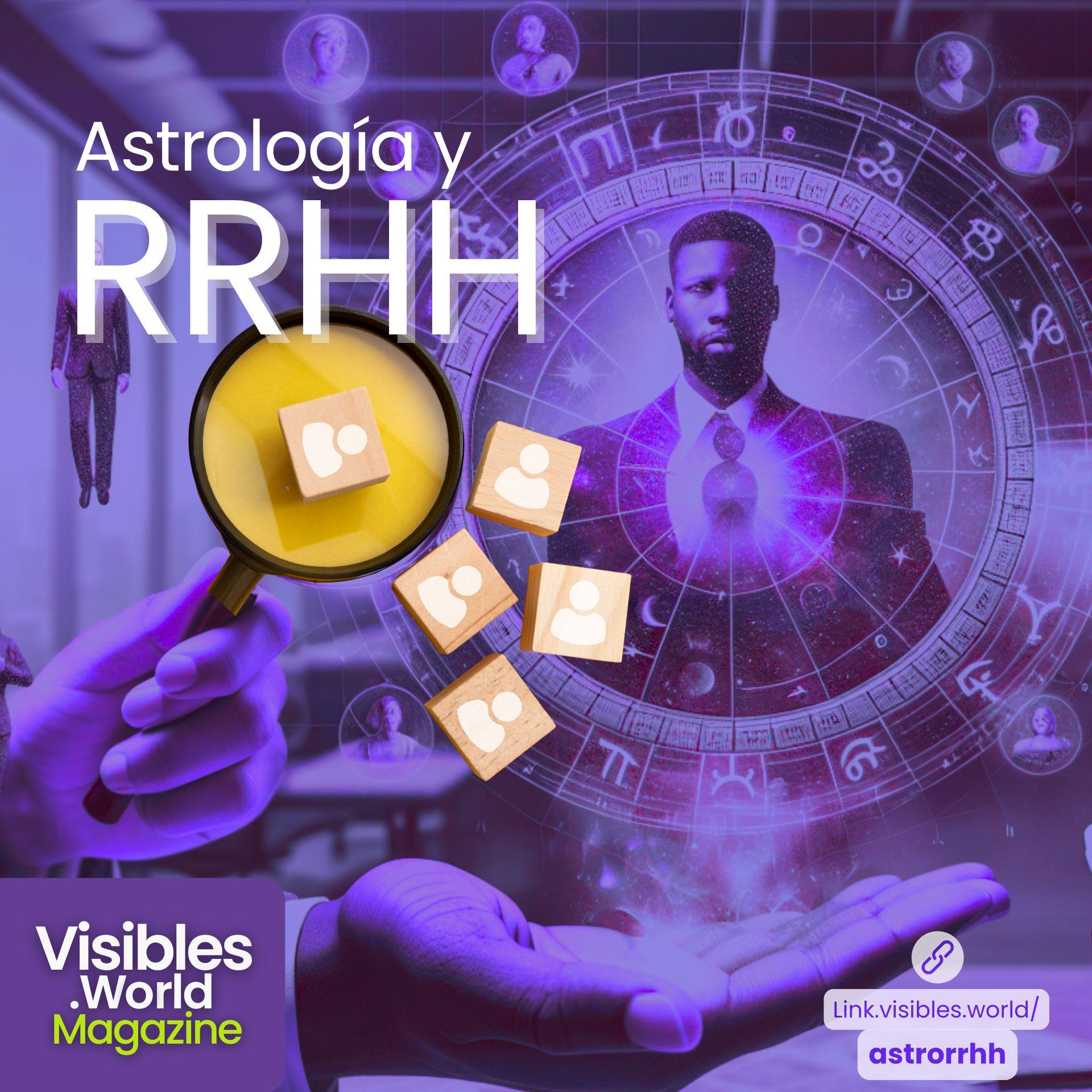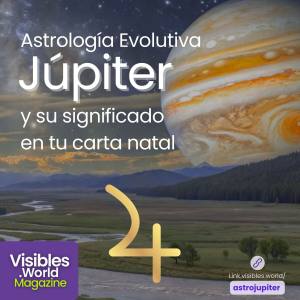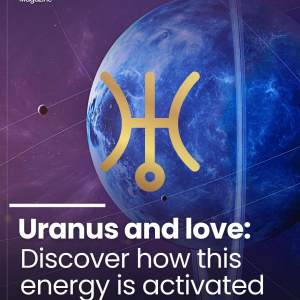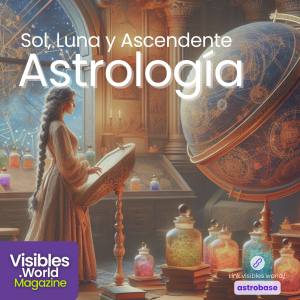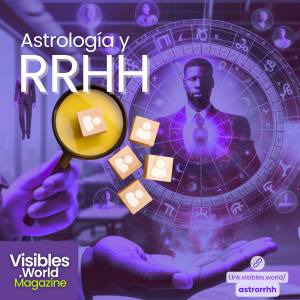Astrology in Human Resources: An Innovative Approach to Personnel Selection
Astrology in human resources can offer a unique and valuable perspective in the recruitment process. In this article: we will explore how astrology can complement traditional techniques, bringing a new level of self-awareness and vocational guidance to professionals. However, while this approach is innovative, there are also those who criticize its effectiveness because it lacks a scientific basis. This, however, does not prevent some from finding value in it.
Index
- Introduction to Astrology in Human Resources
- Predictive Astrology vs. Evolutionary Psychological Astrology for Workforce Development
- Astrology as a Tool in Personnel Selection
- Artificial Intelligence Softwares used by Human Resources
- The 12 Houses of the Natal Chart and their Labor Significance
- Characteristics of the Signs and their Application in the Workplace
- The Role of the Candidate according to his Zodiacal Sign
- Vocational Guidance Through Astrology
- Key Moments in Professional Life and Astrology
- Criticisms and Perceptions about Astrology in Companies
- Final Thoughts on Astrology in Human Resources
- FAQ on Astrology in Human Resources
Introduction to Astrology in Human Resources
Astrology in Human Resources is presented as a refreshing and unconventional approach that invites companies to explore new dimensions in personnel selection. This method not only seeks to identify technical skills, but also to delve into personal characteristics of candidates. By integrating astrology into the selection process, organizations can gain a more complete view of each individual; this could lead to more accurate decisions that are aligned with the corporate culture. However, this approach raises questions about its validity, as not everyone is convinced of its effectiveness. Although some companies have adopted this practice, the debate persists.
What if a candidate's birth chart becomes a key tool for understanding his or her potential? This implies an analysis beyond a simple resume; allowing recruiters to learn about each person's motivations, strengths and possible areas of improvement. Astrology can offer a more human and personalized approach. However, this is essential in a working world that seeks to adapt to the changing needs of employees. Although some may doubt its validity, the integration of these elements can enrich the selection process because it allows for a deeper understanding of the individual.
Astrology in human resources is not only limited to personnel selection, but also extends to building efficient and balanced teams. By understanding the dynamics between the different zodiac signs, leaders can foster a work environment where each member brings his or her best. For example, a team composed of fire signs such as Aries, Leo and Sagittarius can excel in creativity and leadership, while the inclusion of earth signs such as Taurus, Virgo and Capricorn can bring stability and organization. This balance is vital to the long-term success of any organization. In addition, recognizing astrological diversity can help prevent internal conflicts and facilitate better collaboration among team members. Thus, astrology can be viewed not only as a selection tool, but as an integral resource for talent management and organizational well-being.
Predictive Astrology vs. Evolutionary Psychological Astrology for Workforce Development
In the field of astrology it is essential to distinguish between classical (predictive) astrology and psychological astrology. The former focuses on foreseeing possible events based on a certain deterministic character about personalities and can be seen as more esoteric; However, the second focuses (the one we do in Visibles World through the Natal Chart Reading focused on work development), focuses on self-knowledge, understanding the personality, the possible automatic mechanisms of emotional survival, especially in the first 5 years and that can have repercussions in adult life; as well as focusing on the Sun, the Earth houses, Ascendant and North Node. This is important, because although both branches share certain similarities, their purposes are different.
Evolutionary Psychological Astrology thus becomes a valuable resource for personal and professional development; helping individuals to discover their true vocations and companies to seek talents that align with their goals and values.
Astrology as a Tool in Personnel Selection
The birth chart, which reveals the position of the planets at the time of a person's birth, becomes an essential tool in personnel selection. By looking at a candidate's birth chart, one can identify behavioral patterns, natural abilities and possible challenges they may face in their working life. However, this approach cannot be seen metaphorically as a cooking recipe with its ingredients and ways of cooking; because, although it provides valuable information, each person is unique along with their experiences, tastes and job development can vary from the perspective and level of consciousness that the person is "inhabiting and unfolding". In addition, some belief, social, family and cultural structures allow certain aspects of the personality not to develop naturally (an example is that at a social level in our culture, we are not accustomed to emotional management, and only in this decade we are beginning to see progress in this aspect).
This in-depth analysis allows recruiters to have a clearer vision of how a candidate might perform in a specific work environment. For example, a candidate with a strong Pluto presence might not be the best choice recommended for working with infants or even in a customer service position, given the level of intensity associated with this planet which is best understood by having recommend a position as a researcher of topics that many do not dare to see, as well as health personnel, politicians (especially if the sign of Scorpio or Pluto are in the tenth house), since people in these areas have the ability to contain and be in situations where there is much intensity; therefore people with strong Plutonian presence are recommended for specific occupations.
Astrology can be used in an ethical and transparent manner by alerting candidates to the use of their natal chart in the selection process; this could help build trust and openness. The key is to use this information as a complement to traditional assessments while avoiding the deterministic and exclusive; astrology can offer valuable insights, it is not desirable for it to be the sole consideration because this could lead to biased decisions.
Astrology as a tool for self-knowledge can help candidates to reflect on their own characteristics and how these can influence their job performance; even as an additional idea, the company could share or give the report with their capabilities, gifts and talents; contributing to the human development of the person, even if it is not selected; and at the same time it can be a promotional marketing tool that validates the company's commitment to its identity and Corporate Social Responsibility (instead of giving away merchandising pencils, the company can give away a much greater value to both the unsuccessful candidates and to those who will soon be part of the company's team).This not only benefits the company in recruiting; it also empowers individuals in their professional development. Although some may question its validity as they may have a different perspective on life and for them it could be that the information may be subjective depending on their belief system; but at the same time it is a fact that companies are valuing birth chart information for recruitment purposes.
Artificial Intelligence software used by HR?
The birth chart, correctly interpreted by people who know the subject of astrology, presents itself as a powerful tool in the field of recruitment, offering a deep insight into the candidate's profile. The astrological document, which reflects the position of the planets at the time of birth, can help recruiters understand not only the candidate's skills and talents, but also his or her inherent motivations and challenges. However, insisting that it requires a careful analysis and guided by people with experience in astrology; even if the recruiter were to use artificial intelligence software to do the analysis, there are many factors that escape the AI software; especially the soft skills and inherent characteristics of human beings such as intuition, the experience of the recruiter, the professional tools that occupy the HR, and obviously taking into account the mistakes made by artificial intelligence software even when supplying the recruiter with the right information. artificial intelligence software, even when supplied with a robust prompt, hours of training and even when given specific data, can change the order of the houses or confuse variables, resulting in an incorrect reading and interpretation that could damage the company through an inadequate recruitment..
This means that each chart is an individual and unique map; one that can reveal how a candidate might interact in a specific work environment. By analyzing the birth chart, patterns of behavior and skills can be identified that may not be evident in a traditional resume.
In addition, ethics play a key role in this process: it is essential that candidates are informed about the use of their birth chart. By fostering an environment of trust and transparency in the selection process, this can enhance the experience for all involved. However, there are those who question the relevance of these aspects even though their importance is undeniable.
The 12 Houses of the Natal Chart and their Labor Significance
The natal chart which is divided into 12 houses represents different aspects of a person's life. In the work context, there are however three houses that we focus on when it comes to work astrology: House 2, House 6 and House 10. Although these houses are essential for professional development, this does not mean that the others are unimportant, because each one has its own value.
- House 2: Represents the value of exchange and the way an individual presents himself to the world. A candidate with a strong presence in this house can be seen as a natural leader (here is a full article on this house).
- House 6: Related to daily work and organization. Here you can observe how the candidate handles his work routine and his ability to work in a team.
- House 10: Reflects the career and public projection. This house can indicate the career path an individual is destined to follow and how they wish to be perceived in their work environment.
Understanding these houses allows recruiters to have a more complete view of the candidate in that area; helping to make decisions more aligned with the company's culture and goals. also because it facilitates the selection process. Although there are many factors to consider, this understanding helps in identifying the best talent.
If you want to know the twelve astrological houses, I invite you to read this article
Characteristics of the Signs and their Application in the Workplace
Each zodiac sign undoubtedly has unique characteristics that can influence an individual's job performance. For example, Aries is known for his energy and leadership: this makes him an ideal candidate for senior management positions (as long as he has developed his emotional system to work in balance and avoid conflict with the team, especially issues of rage, anger or lack of delegation as it is a sign inclined with the "martial" (mars), which is a warrior who goes for everything and needs to transform that energy into actions and release these emotions through wellness and physical activities frequently, . However, Taurus, with its focus on stability and organization, could be perfect for roles in financial management, work where time is an ally, accounting and administration in general; however, those who have the sun in Taurus or ascendant or moon, do not like changes and try to have some stability and maintain as much as possible a state with few variables that destabilize their sense of comfort; this is important to detect especially in companies or technology startups, which often need to be redesigned quickly and that is a big challenge for signs with sun or moon in taurus.
In contrast, signs like Cancer can be more sensitive and empathetic, which makes them ideal for roles involving customer service or teamwork. By taking these characteristics into account: recruiters can select candidates who not only possess the necessary technical skills, but also align with the company's culture and existing team; this can sometimes be tricky, because diversity of personalities also plays an important role. While some might argue that these qualities are secondary, the reality is that they are critical to success in many organizations.
The Cultural Role of Zodiac Signs in the Workplace
A candidate's sun sign can offer clues to his or her ideal role within an organization. For example, a Sagittarius might excel in roles that require creativity and exploration, travel, philosophy; however, a Capricorn would be better suited for positions related to structure and responsibility and service to others through a methodology they can create within the company; management, financial and educational positions, among other areas of work. Although this may seem trivial, many believe in the influence of the stars, because the personality of a person can be aligned with their sign; it is not by chance that the concept and astral influence has been in various cultures, societies, and even ancestral and religious, no matter where in the world (whether Eastern or Western as other peoples); this allows to create spaces of diversity and cultural acceptance.
For example, in Tulum, in the Riviera Maya of the Mexican Caribbean, the streets in the center of the city are named after constellations, zodiacal signs and even planets; in other places, the influence of other astrological factors can also have an impact on the city.
Likewise, the influence of other astrological factors - such as ascendant or moon - can further nuanced the candidate's profile; offering a richer and more complex view of his or her personality and potential in a work environment. However, this becomes crucial because the importance of such elements cannot be underestimated. Although it is considered fundamental, many ignore these aspects.
Vocational Guidance Through Astrology
Astrology can not only be useful in personnel selection but can also offer valuable vocational guidance. At key moments in life such as choosing a career after leaving school or during crises that may occur, for example, in adulthood, astrology can provide clarity and direction.
Career counseling sessions can include an analysis of the natal chart, identifying areas where the candidate might shine, and possible difficulties they might face. This personalized approach not only empowers the individual, but also helps companies cultivate talent that is aligned with their mission and values.
For more information on how astrology can influence work development, visit Astrology for Work Development and discover how to empower your work life. You can also explore The Importance of the 12 Astrological Houses to understand how they influence your career path.
Key Moments in Professional Life and Astrology
Professional life is undoubtedly marked by several key moments that can generate uncertainty and reflection. Astrology can offer guidance at these times; helping people to understand their own motivations and decisions. For example although Saturn's return, which occurs between 28 and 30 years, is a period of personal transformation. At this time however , many people review their career path and ask questions about their future career, because this can lead to new opportunities and challenges.
Other significant moments include the mid-life crisis, which generally occurs between 41 and 43, as well as between 47 and 53 with the return of Chiron (a comet that takes on great importance in Jungian Psychological astrological interpretation), where people reflect on what they have achieved and what they still wish to achieve. Astrology can help navigate these transitions: providing clarity and direction. However, it is important to consider that many people, although they are in this stage, may feel lost or continue their lives normally, assuming as natural processes something that is socially normal; (as the prominent sociologist and professor Harold Moscovitz said in the courses he did as the spiritual energy therapy Golden Light Development, "Normal does not mean that it is natural"; the normal is based on norms or laws, more social rules; while the natural has its foundations in the principles of nature and its way of structuring; as for example: the principle within the paradigm or belief system of what is the force of gravity).
Criticisms and Perceptions about Astrology in Business
Despite its benefits, astrology in the business context often faces criticism and skepticism. Many see it as an esoteric and unprofessional practice; this happens in our opinion because astrology has its own filter and many tend to confuse astrology with the horoscope (a rather marketing invention, which was intended to summarize a whole astrological system in just a few lines of a newspaper, with a deterministic tinge, which is very typical in classical astrology of medieval times;Metaphorically the horoscope would be similar to creating a whole book with only one letter; therefore it ceases to have a practical sense and astrology has been distorted through that bias).
The perception of astrology also varies according to organizational culture. In more open and innovative companies, astrology may be seen as a valuable resource for fostering a more supportive and humane work environment. However, this is not universal; many organizations may consider it unserious or even unnecessary; the key is for companies that desire an innovative profile to engage it ethically and transparently when using Evolutionary Psychological Astrology.
Final Thoughts on Astrology in Human Resources
Astrology in human resources represents an opportunity to enrich the selection and professional development process: through an ethical and transparent approach, companies can use Psychological Evolutionary astrology as a tool to better understand their employees, and foster a positive work environment. However, this use raises questions, because some may question its validity. Although it is an unconventional approach, many believe it can be beneficial in certain contexts.
The essential key lies in integrating this practice with professionals who can guide the recruiter along with implementing traditional recruiter techniques; it is highly suggested that the recruiter can enlist the help of astrologers to help interpret the characteristics of candidates allowing for a partnership through consulting, or even training the recruiter to use artificial intelligence focused on job astrology; allowing recruiters to make more informed decisions aligned with the organization's values, along with the reassurance and accountability that the astrologer can provide. At the end of the day, the goal is to create and complement teams that are not only competent, but also feel valued and understood.
For those interested in exploring more about how astrology can impact the workplace, we invite you to visit the Workplace Astrology consultation service and discover the benefits this practice can offer.
FAQ about Astrology in Human Resources
What is human resources astrology?
Human resources astrology is the application of evolutionary psychological astrological principles to better understand the characteristics and potentials of candidates in a selection and career development process.
How can astrology help in personnel selection?
Astrology in certain contexts can complement psychometric assessments; providing a more complete picture of a candidate's personality and motivations and facilitating informed decision making.
Is it ethical to use astrology in selection processes?
Yes, as long as it is used in a transparent manner and candidates are informed about its use: astrology can be an ethical and valuable tool in the selection process. However, this approach requires a genuine commitment because honesty is important, not only for the people involved but also for the identity of the company along with its corporate culture.
What are the key moments in professional life where astrology can be useful?
At various times that resonate with you, such as Saturn return, mid-life crisis and other significant milestones, such as changing jobs, making a major life change, moving to another country, vocational or company orientation, change of corporate management, astrological charts of investors and management team, among many others, can actually be moments when Evolutionary psychological astrology focused on Work Development provides clarity and direction in professional decision making; it is important to remember that each astrological professional interprets them differently (it is not the same as a cooking recipe).
What kind of information can a birth chart offer in the work context?
A natal chart can in some cases offer information about a candidate's personality, skills and challenges; helping recruiters better understand how they may or may not fit into the company's culture and goals. While this is valuable, some might question its relevance. However, its use could be effective because it provides a unique perspective.
For more information on the relationship between astrology and human resources, feel free to contact us and visit The Importance of the 12 Astrological Houses and how they can influence your career path.
Astrology in human resources can offer a unique and valuable perspective in the recruitment process. In this article: we will explore how astrology can complement traditional techniques, bringing a new level of self-awareness and vocational guidance to professionals. However, while this approach is innovative, there are also those who criticize its effectiveness because it lacks a scientific basis. This, however, does not prevent some from finding value in it.
Index
- Introduction to Astrology in Human Resources
- Predictive Astrology vs. Evolutionary Psychological Astrology for Workforce Development
- Astrology as a Tool in Personnel Selection
- Artificial Intelligence Softwares used by Human Resources
- The 12 Houses of the Natal Chart and their Labor Significance
- Characteristics of the Signs and their Application in the Workplace
- The Role of the Candidate according to his Zodiacal Sign
- Vocational Guidance Through Astrology
- Key Moments in Professional Life and Astrology
- Criticisms and Perceptions about Astrology in Companies
- Final Thoughts on Astrology in Human Resources
- FAQ on Astrology in Human Resources
Introduction to Astrology in Human Resources
Astrology in Human Resources is presented as a refreshing and unconventional approach that invites companies to explore new dimensions in personnel selection. This method not only seeks to identify technical skills, but also to delve into personal characteristics of candidates. By integrating astrology into the selection process, organizations can gain a more complete view of each individual; this could lead to more accurate decisions that are aligned with the corporate culture. However, this approach raises questions about its validity, as not everyone is convinced of its effectiveness. Although some companies have adopted this practice, the debate persists.
What if a candidate's birth chart becomes a key tool for understanding his or her potential? This implies an analysis beyond a simple resume; allowing recruiters to learn about each person's motivations, strengths and possible areas of improvement. Astrology can offer a more human and personalized approach. However, this is essential in a working world that seeks to adapt to the changing needs of employees. Although some may doubt its validity, the integration of these elements can enrich the selection process because it allows for a deeper understanding of the individual.
Astrology in human resources is not only limited to personnel selection, but also extends to building efficient and balanced teams. By understanding the dynamics between the different zodiac signs, leaders can foster a work environment where each member brings his or her best. For example, a team composed of fire signs such as Aries, Leo and Sagittarius can excel in creativity and leadership, while the inclusion of earth signs such as Taurus, Virgo and Capricorn can bring stability and organization. This balance is vital to the long-term success of any organization. In addition, recognizing astrological diversity can help prevent internal conflicts and facilitate better collaboration among team members. Thus, astrology can be viewed not only as a selection tool, but as an integral resource for talent management and organizational well-being.
Predictive Astrology vs. Evolutionary Psychological Astrology for Workforce Development
In the field of astrology it is essential to distinguish between classical (predictive) astrology and psychological astrology. The former focuses on foreseeing possible events based on a certain deterministic character about personalities and can be seen as more esoteric; However, the second focuses (the one we do in Visibles World through the Natal Chart Reading focused on work development), focuses on self-knowledge, understanding the personality, the possible automatic mechanisms of emotional survival, especially in the first 5 years and that can have repercussions in adult life; as well as focusing on the Sun, the Earth houses, Ascendant and North Node. This is important, because although both branches share certain similarities, their purposes are different.
Evolutionary Psychological Astrology thus becomes a valuable resource for personal and professional development; helping individuals to discover their true vocations and companies to seek talents that align with their goals and values.
Astrology as a Tool in Personnel Selection
The birth chart, which reveals the position of the planets at the time of a person's birth, becomes an essential tool in personnel selection. By looking at a candidate's birth chart, one can identify behavioral patterns, natural abilities and possible challenges they may face in their working life. However, this approach cannot be seen metaphorically as a cooking recipe with its ingredients and ways of cooking; because, although it provides valuable information, each person is unique along with their experiences, tastes and job development can vary from the perspective and level of consciousness that the person is "inhabiting and unfolding". In addition, some belief, social, family and cultural structures allow certain aspects of the personality not to develop naturally (an example is that at a social level in our culture, we are not accustomed to emotional management, and only in this decade we are beginning to see progress in this aspect).
This in-depth analysis allows recruiters to have a clearer vision of how a candidate might perform in a specific work environment. For example, a candidate with a strong Pluto presence might not be the best choice recommended for working with infants or even in a customer service position, given the level of intensity associated with this planet which is best understood by having recommend a position as a researcher of topics that many do not dare to see, as well as health personnel, politicians (especially if the sign of Scorpio or Pluto are in the tenth house), since people in these areas have the ability to contain and be in situations where there is much intensity; therefore people with strong Plutonian presence are recommended for specific occupations.
Astrology can be used in an ethical and transparent manner by alerting candidates to the use of their natal chart in the selection process; this could help build trust and openness. The key is to use this information as a complement to traditional assessments while avoiding the deterministic and exclusive; astrology can offer valuable insights, it is not desirable for it to be the sole consideration because this could lead to biased decisions.
Astrology as a tool for self-knowledge can help candidates to reflect on their own characteristics and how these can influence their job performance; even as an additional idea, the company could share or give the report with their capabilities, gifts and talents; contributing to the human development of the person, even if it is not selected; and at the same time it can be a promotional marketing tool that validates the company's commitment to its identity and Corporate Social Responsibility (instead of giving away merchandising pencils, the company can give away a much greater value to both the unsuccessful candidates and to those who will soon be part of the company's team).This not only benefits the company in recruiting; it also empowers individuals in their professional development. Although some may question its validity as they may have a different perspective on life and for them it could be that the information may be subjective depending on their belief system; but at the same time it is a fact that companies are valuing birth chart information for recruitment purposes.
Artificial Intelligence software used by HR?
The birth chart, correctly interpreted by people who know the subject of astrology, presents itself as a powerful tool in the field of recruitment, offering a deep insight into the candidate's profile. The astrological document, which reflects the position of the planets at the time of birth, can help recruiters understand not only the candidate's skills and talents, but also his or her inherent motivations and challenges. However, insisting that it requires a careful analysis and guided by people with experience in astrology; even if the recruiter were to use artificial intelligence software to do the analysis, there are many factors that escape the AI software; especially the soft skills and inherent characteristics of human beings such as intuition, the experience of the recruiter, the professional tools that occupy the HR, and obviously taking into account the mistakes made by artificial intelligence software even when supplying the recruiter with the right information. artificial intelligence software, even when supplied with a robust prompt, hours of training and even when given specific data, can change the order of the houses or confuse variables, resulting in an incorrect reading and interpretation that could damage the company through an inadequate recruitment..
This means that each chart is an individual and unique map; one that can reveal how a candidate might interact in a specific work environment. By analyzing the birth chart, patterns of behavior and skills can be identified that may not be evident in a traditional resume.
In addition, ethics play a key role in this process: it is essential that candidates are informed about the use of their birth chart. By fostering an environment of trust and transparency in the selection process, this can enhance the experience for all involved. However, there are those who question the relevance of these aspects even though their importance is undeniable.
The 12 Houses of the Natal Chart and their Labor Significance
The natal chart which is divided into 12 houses represents different aspects of a person's life. In the work context, there are however three houses that we focus on when it comes to work astrology: House 2, House 6 and House 10. Although these houses are essential for professional development, this does not mean that the others are unimportant, because each one has its own value.
- House 2: Represents the value of exchange and the way an individual presents himself to the world. A candidate with a strong presence in this house can be seen as a natural leader (here is a full article on this house).
- House 6: Related to daily work and organization. Here you can observe how the candidate handles his work routine and his ability to work in a team.
- House 10: Reflects the career and public projection. This house can indicate the career path an individual is destined to follow and how they wish to be perceived in their work environment.
Understanding these houses allows recruiters to have a more complete view of the candidate in that area; helping to make decisions more aligned with the company's culture and goals. also because it facilitates the selection process. Although there are many factors to consider, this understanding helps in identifying the best talent.
If you want to know the twelve astrological houses, I invite you to read this article
Characteristics of the Signs and their Application in the Workplace
Each zodiac sign undoubtedly has unique characteristics that can influence an individual's job performance. For example, Aries is known for his energy and leadership: this makes him an ideal candidate for senior management positions (as long as he has developed his emotional system to work in balance and avoid conflict with the team, especially issues of rage, anger or lack of delegation as it is a sign inclined with the "martial" (mars), which is a warrior who goes for everything and needs to transform that energy into actions and release these emotions through wellness and physical activities frequently, . However, Taurus, with its focus on stability and organization, could be perfect for roles in financial management, work where time is an ally, accounting and administration in general; however, those who have the sun in Taurus or ascendant or moon, do not like changes and try to have some stability and maintain as much as possible a state with few variables that destabilize their sense of comfort; this is important to detect especially in companies or technology startups, which often need to be redesigned quickly and that is a big challenge for signs with sun or moon in taurus.
In contrast, signs like Cancer can be more sensitive and empathetic, which makes them ideal for roles involving customer service or teamwork. By taking these characteristics into account: recruiters can select candidates who not only possess the necessary technical skills, but also align with the company's culture and existing team; this can sometimes be tricky, because diversity of personalities also plays an important role. While some might argue that these qualities are secondary, the reality is that they are critical to success in many organizations.
The Cultural Role of Zodiac Signs in the Workplace
A candidate's sun sign can offer clues to his or her ideal role within an organization. For example, a Sagittarius might excel in roles that require creativity and exploration, travel, philosophy; however, a Capricorn would be better suited for positions related to structure and responsibility and service to others through a methodology they can create within the company; management, financial and educational positions, among other areas of work. Although this may seem trivial, many believe in the influence of the stars, because the personality of a person can be aligned with their sign; it is not by chance that the concept and astral influence has been in various cultures, societies, and even ancestral and religious, no matter where in the world (whether Eastern or Western as other peoples); this allows to create spaces of diversity and cultural acceptance.
For example, in Tulum, in the Riviera Maya of the Mexican Caribbean, the streets in the center of the city are named after constellations, zodiacal signs and even planets; in other places, the influence of other astrological factors can also have an impact on the city.
Likewise, the influence of other astrological factors - such as ascendant or moon - can further nuanced the candidate's profile; offering a richer and more complex view of his or her personality and potential in a work environment. However, this becomes crucial because the importance of such elements cannot be underestimated. Although it is considered fundamental, many ignore these aspects.
Vocational Guidance Through Astrology
Astrology can not only be useful in personnel selection but can also offer valuable vocational guidance. At key moments in life such as choosing a career after leaving school or during crises that may occur, for example, in adulthood, astrology can provide clarity and direction.
Career counseling sessions can include an analysis of the natal chart, identifying areas where the candidate might shine, and possible difficulties they might face. This personalized approach not only empowers the individual, but also helps companies cultivate talent that is aligned with their mission and values.
For more information on how astrology can influence work development, visit Astrology for Work Development and discover how to empower your work life. You can also explore The Importance of the 12 Astrological Houses to understand how they influence your career path.
Key Moments in Professional Life and Astrology
Professional life is undoubtedly marked by several key moments that can generate uncertainty and reflection. Astrology can offer guidance at these times; helping people to understand their own motivations and decisions. For example although Saturn's return, which occurs between 28 and 30 years, is a period of personal transformation. At this time however , many people review their career path and ask questions about their future career, because this can lead to new opportunities and challenges.
Other significant moments include the mid-life crisis, which generally occurs between 41 and 43, as well as between 47 and 53 with the return of Chiron (a comet that takes on great importance in Jungian Psychological astrological interpretation), where people reflect on what they have achieved and what they still wish to achieve. Astrology can help navigate these transitions: providing clarity and direction. However, it is important to consider that many people, although they are in this stage, may feel lost or continue their lives normally, assuming as natural processes something that is socially normal; (as the prominent sociologist and professor Harold Moscovitz said in the courses he did as the spiritual energy therapy Golden Light Development, "Normal does not mean that it is natural"; the normal is based on norms or laws, more social rules; while the natural has its foundations in the principles of nature and its way of structuring; as for example: the principle within the paradigm or belief system of what is the force of gravity).
Criticisms and Perceptions about Astrology in Business
Despite its benefits, astrology in the business context often faces criticism and skepticism. Many see it as an esoteric and unprofessional practice; this happens in our opinion because astrology has its own filter and many tend to confuse astrology with the horoscope (a rather marketing invention, which was intended to summarize a whole astrological system in just a few lines of a newspaper, with a deterministic tinge, which is very typical in classical astrology of medieval times;Metaphorically the horoscope would be similar to creating a whole book with only one letter; therefore it ceases to have a practical sense and astrology has been distorted through that bias).
The perception of astrology also varies according to organizational culture. In more open and innovative companies, astrology may be seen as a valuable resource for fostering a more supportive and humane work environment. However, this is not universal; many organizations may consider it unserious or even unnecessary; the key is for companies that desire an innovative profile to engage it ethically and transparently when using Evolutionary Psychological Astrology.
Final Thoughts on Astrology in Human Resources
Astrology in human resources represents an opportunity to enrich the selection and professional development process: through an ethical and transparent approach, companies can use Psychological Evolutionary astrology as a tool to better understand their employees, and foster a positive work environment. However, this use raises questions, because some may question its validity. Although it is an unconventional approach, many believe it can be beneficial in certain contexts.
The essential key lies in integrating this practice with professionals who can guide the recruiter along with implementing traditional recruiter techniques; it is highly suggested that the recruiter can enlist the help of astrologers to help interpret the characteristics of candidates allowing for a partnership through consulting, or even training the recruiter to use artificial intelligence focused on job astrology; allowing recruiters to make more informed decisions aligned with the organization's values, along with the reassurance and accountability that the astrologer can provide. At the end of the day, the goal is to create and complement teams that are not only competent, but also feel valued and understood.
For those interested in exploring more about how astrology can impact the workplace, we invite you to visit the Workplace Astrology consultation service and discover the benefits this practice can offer.
FAQ about Astrology in Human Resources
What is human resources astrology?
Human resources astrology is the application of evolutionary psychological astrological principles to better understand the characteristics and potentials of candidates in a selection and career development process.
How can astrology help in personnel selection?
Astrology in certain contexts can complement psychometric assessments; providing a more complete picture of a candidate's personality and motivations and facilitating informed decision making.
Is it ethical to use astrology in selection processes?
Yes, as long as it is used in a transparent manner and candidates are informed about its use: astrology can be an ethical and valuable tool in the selection process. However, this approach requires a genuine commitment because honesty is important, not only for the people involved but also for the identity of the company along with its corporate culture.
What are the key moments in professional life where astrology can be useful?
At various times that resonate with you, such as Saturn return, mid-life crisis and other significant milestones, such as changing jobs, making a major life change, moving to another country, vocational or company orientation, change of corporate management, astrological charts of investors and management team, among many others, can actually be moments when Evolutionary psychological astrology focused on Work Development provides clarity and direction in professional decision making; it is important to remember that each astrological professional interprets them differently (it is not the same as a cooking recipe).
What kind of information can a birth chart offer in the work context?
A natal chart can in some cases offer information about a candidate's personality, skills and challenges; helping recruiters better understand how they may or may not fit into the company's culture and goals. While this is valuable, some might question its relevance. However, its use could be effective because it provides a unique perspective.
For more information on the relationship between astrology and human resources, feel free to contact us and visit The Importance of the 12 Astrological Houses and how they can influence your career path.

Realizado por: Gabriel Agustín Garay Opaso, CEO de Visibles World "Me formé en Astrología Laboral en la destacada escuela Astroterapéutica de Pablo Flores Laymuns, dónde la perspectiva central es lo emocional evolutivo; hice también cursos de Astrología Kabbalistica, talleres sobre las casas Astrológicas de Terra, cursos sobre el Nodo Norte del propósito de alma, y de Saturno, Manifiesta tu realidad" Te puedo ayudar también interpretando tu Carta Astral enfocado en tu Desarrollo Laboral y también en proyectos propios ó empresas que tengas a cargo, ayudando a através de mi Agencia Creativa de Comunicaciones ó desde la Astrología enfocada en las RRHH con mis consultorías. Escríbeme
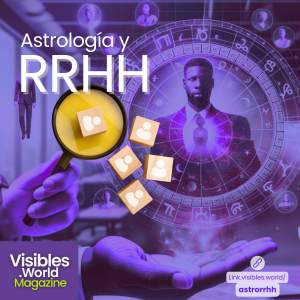

 ES
ES  EN
EN 